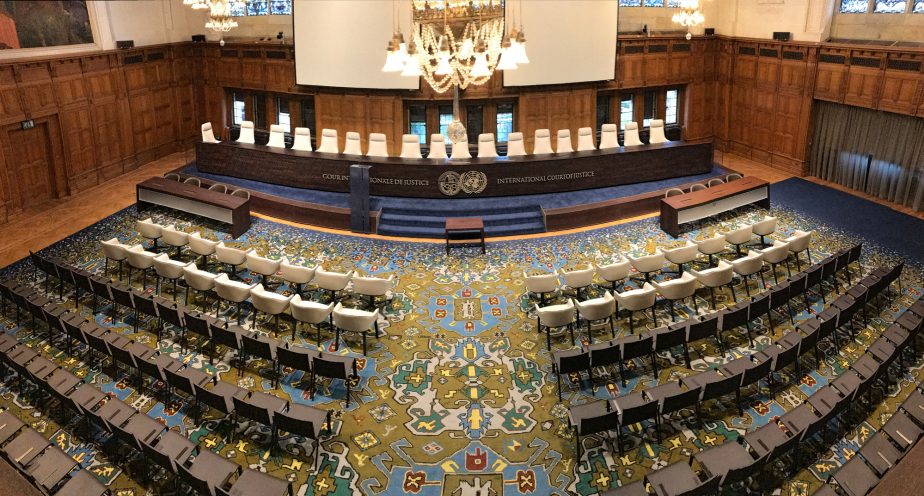SAC-M’s 21 February statement quoted by the Diplomat
Myanmar Genocide Hearings Open, Overshadowed by Question of Recognition
The International Court of Justice has drawn criticism for allowing representatives of the military junta to represent Myanmar at hearings this week.
22 February, 2022
By Sebastian Strangio
Lawyers representing Myanmar’s military rulers yesterday demanded the dismissal of a case accusing it of genocide against the Rohingya minority group, as the International Court of Justice (ICJ) resumed hearings into the complaint brought against Myanmar by The Gambia in 2017.
The complaint concerned the Myanmar military’s fierce assaults on Rohingya communities in western Myanmar in late 2017, which drove more than 700,000 civilians across the border into Bangladesh, and which United Nations researchers claimed showed “genocidal intent.”
This week, the ICJ is holding hearings to address the long list of preliminary objections filed by Myanmar’s civilian government in January 2021, just 10 days before the military’s coup d’état, which challenged the court’s jurisdiction.
According to the Associated Press, lawyers representing Myanmar repeated these objections in yesterday’s hearing, challenging the case on the technical grounds that the ICJ only hears cases between states, while the Rohingya genocide case was brought by The Gambia on behalf of the Organization of Islamic States. The junta’s legal team, which was led by Ko Ko Hlaing, the minister for international cooperation, argued that The Gambia could not bring the case to the ICJ as it had no direct link to the events in Myanmar.
However, the question of whether or not Myanmar is guilty of genocide has been subsumed within the heated struggle between the junta and its array of opponents. In particular, this week’s hearings have been overshadowed by the question of who has the right to recognize Myanmar in the genocide case. Earlier this month, Myanmar’s opposition National Unity Government (NUG), which represents the elected civilian government ousted last February, announced that it had formally withdrawn “all preliminary objections” in the case and accepted the jurisdiction of the ICJ.
The NUG also expressed concerns that the ICJ “has been communicating with former Myanmar diplomats in Brussels who are now under junta control” and said the court should deal solely with Kyaw Moe Tun, Myanmar’s ambassador to the U.N., who is loyal to the ousted civilian government.
This came after the NUG said that it would no longer offer a defense in the case, and would accept the court’s verdict on the genocide question – despite the fact that members of the NLD government helped defend and justify the military’s brutal assaults on the Rohingya communities of Rakhine State. These arguably include the country’s ousted civilian leader Aung San Suu Kyi, who has been in detention since the coup. She led the country’s legal team at earlier hearings in the case in 2019, during which she asserted that The Gambia had presented an “incomplete and misleading factual picture of the situation in Rakhine State.”
In line with the NUG’s complaints, the ICJ has come under heavy criticism for allowing Myanmar’s military administration to represent Myanmar at this week’s hearings, on the grounds that it marked the beginning of its acceptance as Myanmar’s legitimate government. “It is outrageous for the ICJ to proceed with these hearings on the basis of junta representation,” Chris Sidoti, a member of the Special Advisory Council for Myanmar, said in a statement. “The junta is not the government of Myanmar, it does not represent the state of Myanmar, and it is dangerous for the court to allow it to present itself as such.” The SAC-M statement pointed out that “no other United Nations (UN) body has accepted the junta as representing Myanmar.”
In a statement ahead of yesterday’s hearing, the NUG’s Foreign Minister, Zin Mar Aung, said that it would be a “profound injustice to the Rohingya if the military were to be both their abusers and have any voice in the court.” She said that the NUG was working toward the establishment of an inclusive federal system in which there would be “a special place for Rohingya communities.”
As the hearing started, the court’s president, U.S. Judge Joan Donoghue, attempted to sidestep the question of legitimacy by noting “that the parties to a contentious case before the court are states, not particular governments.”
It is hard to know impact this will have on the question of diplomatic recognition. The identity of Myanmar’s legitimate government is not a question that the ICJ is equipped to solve, though it could have opted to adjourn the court hearings until the Credentials Committee of the U.N. General Assembly makes a ruling on the matter.
But with the Committee choosing late last year to defer a final decision, this would run the risk of indefinitely delaying the prospect of justice and accountability for the Rohingya, to the extent that the ICJ can meaningfully deliver it. In the end, the question of recognition will probably be determined more by the balance of force within Myanmar than the decisions made by judges in The Hague.


